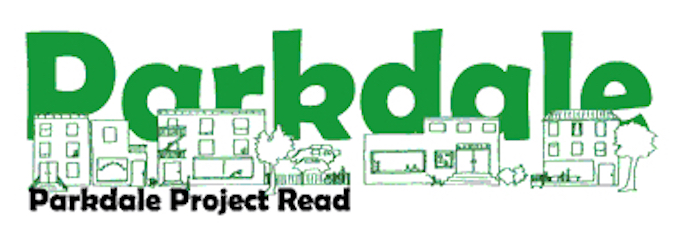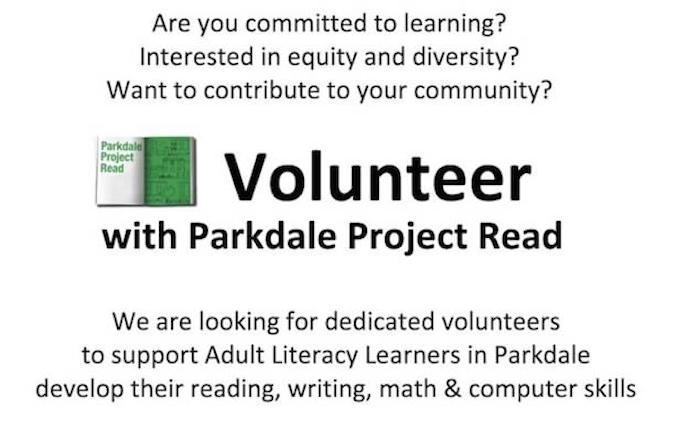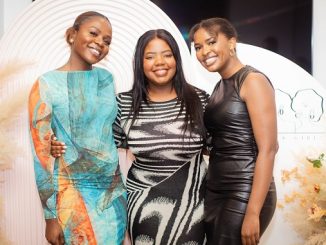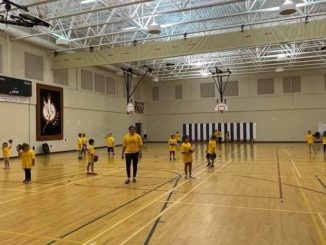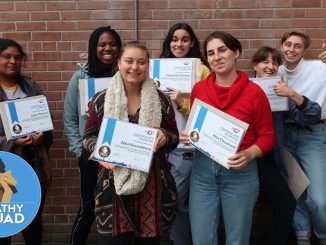I chatted with the good people at Parkdale Project Read, an adult training program that helps adults and youth in the community reach adequate levels of literacy, math skills, and computer skills.
Find out how you can help this awesome project that is making our city more awesome every day.
What types of adult literacy courses are held at your space?
Group learning focuses on topics such as writing, math, computers, women’s issues, community action and issues of psychiatric survivors. Tutoring and the small group facilitation follow a collaborative, holistic, anti-oppressive model, in which learners determine what they want to learn and how they want to learn it. The children of adult literacy learners attending our program are welcome, and receive homework support in the evening from a child support worker. In collaboration with George Brown College, PPR provides upgrading classes three mornings a week for learners seeking admission to community college or university.
What are literacy problems are we faced with?
Our mandate is:
– to provide a supportive environment for literacy learning by adults, 16 and older, who are fluent in English but disadvantaged and isolated by their difficulty with written language;
– to involve literacy learners and tutors from the community in directing the program;
– to continue to strengthen the program in response to the needs of the participants;
– to promote understanding of the needs of literacy learners in Parkdale;
– to assist community groups in Parkdale to provide services for people who have difficulty accessing services and information because they have difficulty using written language.
Literacy continues to exist as a result of disproportionate learning opportunities for most marginalized. PPR provides access to literacy learning for people living in poverty, and for whom poverty has been a barrier to formal education. We reject the deficit model of literacy learning, which suggests that people need to overcome deficits in literacy learning in order to qualify for economic and social well-being. We believe that barriers to literacy are systemic, not individual deficits, and require systemic changes. We see access to literacy learning not as an invitation for people to “better themselves,” but as fundamental social justice. At the same time, we see the denial of access to information, services and democratic participation by people who have difficulty using written language as a denial of fundamental social justice, one of the ways in which people living in poverty experience oppression. Staff and volunteers work to redress this denial of access in our program, by maintaining an environment which encourages networking and mutual support and which provides access to information, services and democratic participation in alternative ways. We provide information orally or in plain language. We link people with services, advocating for people who are denied services because they cannot access print-based procedures that would allow them to qualify. We support democratic participation in our program, through the collaborative planning of learning programs, community meetings to determine policy and the involvement of literacy learners on the Board of Directors and committees of the Board.
We believe that, in modelling access for those who struggle with literacy, we not only create more access for the literacy learners who participate in our program, but also generate ideas that can spread, creating more access throughout the Parkdale community and beyond. By creating an alternative learning environment, we demonstrate how larger institutions of learning could make learning more accessible to people with negative experiences in school. By providing information orally or in plain language, we demonstrate how other organizations could become less dependent on written language, relying more on face-to-face communication and more accessible ways of communicating in written language. By advocating for people who have been denied access to services because of their difficulty with written language, we flag this problem for organizations which may not be aware of this form of injustice. By supporting democratic participation in our program, we show how this can be done in a way that includes everyone, whatever their level of education or facility with written language.
How many adults vs youth does your space serve?
Overall, we see over 125 adult learners in our space; approximately 50 of them identify as youth.
What do the after four learning/homework classes do to help the community?
Provides access to academic support and use of technology through our learning space. We offer a Children’s Program Support Worker and volunteers who provide homework help to the young people in our space; providing them with opportunities in a learning environment.
Have other neighbourhoods adopted a similar program/organization?
There are a number of community-based literacy programs in Toronto; visit mtml.ca for more information.
What are your biggest challenges?
Funding is always a challenge. We also need to continue to recruit volunteers to keep our learners matched with tutors. It is also a challenge to continue to meet the needs of our community with the ever-changing demands of the funders that provide us with our core funding.
How can our readers help?
Contact PPR if they can donate their time, expertise or supplies, or if your readers work in an organization that might be able to make a corporate donation. Donations can be made by cheque or money order through the mail to the address below or folks can go online to Parkdale Project Read and click “Donate Now.” If their workplace participates in the United Way Donor’s Choice program, consider choosing Parkdale Project Read as the recipient of a one-time or monthly donation through payroll. We also rely on generous gifts of time and in-kind donations.
Parkdale Project Read relies on volunteer tutors and group leaders, board members and community supporters. We’re proud to say we’re a rewarding place to learn for all our community members.
Give us a call to find out how you can get involved. If you have any opportunities to raise funds for a charitable organization, please consider Parkdale Project Read as a recipient.
To join our community as a Learner, Volunteer or Supporter, please contact us at:
Mailing Address: 1209 King Street West, Unit 2 Toronto, Ontario M6K 1G2
Phone: 416-531-6308

